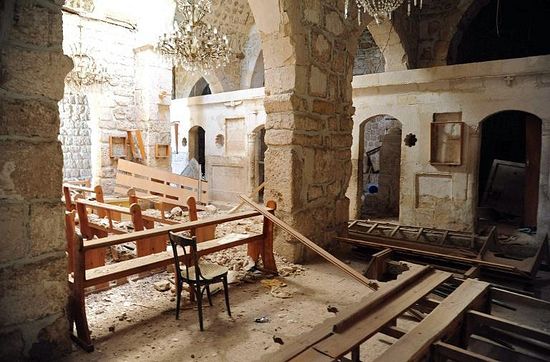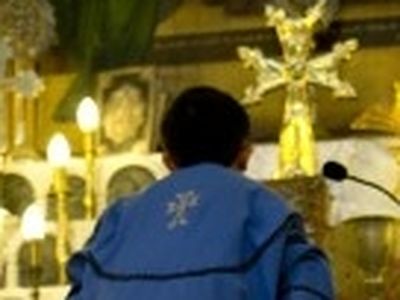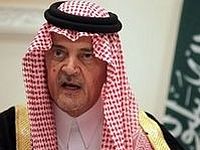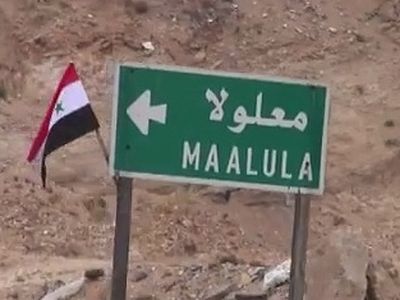Maalula, Syria, April 14, 2014

Syrian troops retook the ancient Christian town of Maalula from rebels Monday, a day after President Bashar al-Assad said the three-year old civil war was turning in his favour.
During the operation, Al-Manar television, the broadcaster of Assad's close Lebanese ally Hezbollah, said three of its staffers were killed.
"The army has taken full control of Maalula and restored security and stability. Terrorism has been defeated in Qalamun," a security official said.
An AFP journalist in Maalula said the Al-Safir hotel, which rebels had been using as a base, was almost completely destroyed, with a facade that gave on to a cliff having collapsed.
Downhill from the hotel, the Mar Sarkis Greek Catholic monastery was also damaged, its walls pierced by mortar rounds, and icons and other religious objects strewn on the ground inside.
 A general view taken on April 14, 2014 shows damage inside the Mar Sarkis Greek Catholic monastery in the ancient Christian town of Maalula (AFP Photo)
A general view taken on April 14, 2014 shows damage inside the Mar Sarkis Greek Catholic monastery in the ancient Christian town of Maalula (AFP Photo)
Those residents who had not fled Maalula in previous fighting were nowhere to be found.
"The village was taken quickly. This morning we took Al-Sarkha village" on a hill overlooking the town, "then we came towards Maalula," a soldier told AFP.
During the operation, Al-Manar said correspondent Hamza al-Hajj Hassan, technician Halim Allaw and cameraman Mohammad Mantash were gunned down by "armed groups," and expressed its condolences.
The three were fired on when they approached an area of town not yet been secured by the army, said journalists at the scene.
Their deaths bring to more than 30 the number of journalists killed covering Syria's war, which Reporters Without Borders describes as the world's most dangerous conflict to report on.
Maalula's capture comes after a string of successes in the strategic Qalamun region, including the seizure of the former rebel bastion of Yabrud last month.
The regime has prioritised capturing the area to protect the highway linking Damascus to Homs that runs through the region, as well as to sever rebel supply lines across the border with Lebanon.
Lebanon's Hezbollah, which has sent thousands of fighters to support Assad's troops, has played a key role in helping the regime secure Qalamun.
Maalula fell to rebel in December, but the Observatory said the regime and Hezbollah are now in "near-total control of the Qalamun area."
Many of the residents of picturesque Maalula speak Aramaic, the language spoken by Jesus, and the town is an important symbol of the ancient Christian presence in Syria.
After the town was captured by rebels, 13 nuns were seized from the Mar Takla Greek Orthodox convent and held by Al-Qaeda-affiliated fighters until a prisoner swap with the regime in March.
-- Assad hails 'turning point' --
Maalula's fall comes a day after Assad said his government was gaining the upper hand in the conflict that began in March 2011 and has left more than 150,000 people dead.
"This is a turning point in the crisis, both militarily in terms of the army's achievements in the war against terror, and socially in terms of national reconciliation processes and growing awareness of the truth behind the (attacks) targeting the country," state news agency SANA quoted the president as saying.
The conflict began as a peaceful protest against Assad, but morphed into a brutal civil war after a brutal crackdown. The regime has systematically blamed all violence on a foreign-backed "terrorist" plot.
Presidential elections are due to be held in June, and Assad is likely to run for re-election.
Elsewhere in Syria on Monday, warplanes struck parts of the central city of Homs that have been under suffocating government siege since June 2012, said the Observatory.
Activist Abu Ziad, who is trapped inside, told AFP via the Internet that there has been a marked escalation in the bombing of besieged areas, with the army "trying to storm (the rebel areas)... under cover of fire."
Earlier this year the UN oversaw the evacuation of around half of some 3,000 people trapped in the area.
According to Abu Ziad, some 180 civilians including 60 activists and more than 1,200 rebel fighters, remain inside.
Meanwhile, the Organisation for the Prohibition of Chemical Weapons (OPCW) said Syria has surrendered "65.1 percent" of its chemical weapons arsenal, "including 57.4 percent of priority chemicals."
Under the terms of a US-Russia brokered deal reached last year, Syria has until the end of June to destroy its chemical weapons.
The agreement was reached after deadly chemical attacks near Damascus last August that killed hundreds.



